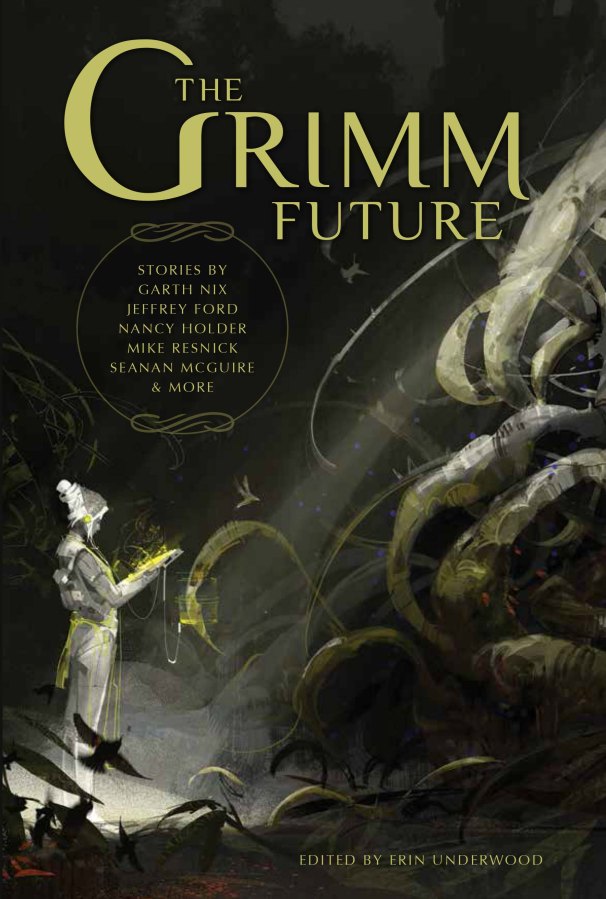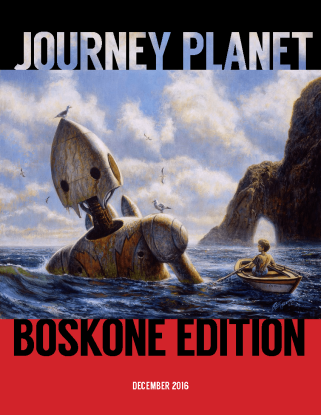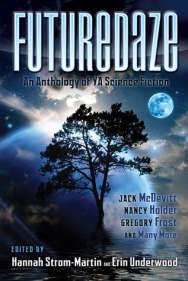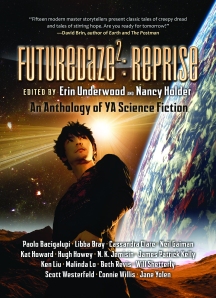
A couple of years ago, I was looking for some new science fiction to read. So, I went to Borders Books and scoured the shelves, considering dozens of books, reading the backs, looking at the covers, and putting most of them back. Then, I picked up The Seeker, a book with an interesting spaceship on the cover, but it was the blurb that caught my eye. “The logical heir to Isaac Asimov and Arthur C. Clarke.” – Stephen King. That got my attention.
 I purchased three books; one of them was The Seeker. I can’t remember the titles or the authors of the other two books. They are long gone. However, within thirty pages of McDevitt’s book, I was a fan. When I finished The Seeker, it went back on my shelf as a keeper. Since then, I have read each of McDevitt’s Alex Benedict novels and enjoyed them all. Echo, the most recent addition to the series, is available now.
I purchased three books; one of them was The Seeker. I can’t remember the titles or the authors of the other two books. They are long gone. However, within thirty pages of McDevitt’s book, I was a fan. When I finished The Seeker, it went back on my shelf as a keeper. Since then, I have read each of McDevitt’s Alex Benedict novels and enjoyed them all. Echo, the most recent addition to the series, is available now.
However, I wanted to know more about the man. Who is Jack McDevitt? What inspires him to write science fiction about a futuristic antiquarian like Alex Benedict? Luckily, he has graciously agreed to be interviewed, satisfying my curiosity. Interviewing with McDevitt was a pleasure, and I’m thrilled to share his responses with you.
~
When did you know that you wanted to be a writer? How long ago did you begin writing professionally?
I started my fiirst novel when I was about eight. Title was The Canals of Mars. Actually, I had two major ambitions growing up: One was to be a science fiction writer; the other was to play shortstop for the Phillies.
I sold my first story in 1979. It was “The Emerson Effect,” published, I believe in the Dec 1979 issue of Twilight Zone. Been writing ever since.
What is it about writing science fiction that you most enjoy or most excites you?
I like the issues I can deal with in SF: Given an opportunity to have a child with an IQ twice as high as mine, would I want to do that? Is machine intelligence possible, and if so, what do you do with an AI that declares it wants to be a Catholic? Are we alone in the universe? If time had no beginning –as it seems it could not–, how did we ever get to 2010? The possibilities go on and on. And it’s just more exciting writing about these sorts of things than about adultery in the suburbs or serial killers or espionage.
Many of your novels feature strong historical themes that center on discovering or recovering the past. Where does your interest in history come from? Do you have a secret historian or antiquarian living inside of you?
 I’ve always been fascinated by important things that get lost. The wonders of the ancient world, most of the plays and histories of the Greeks and Romans, individual acts of generosity and courage. When I was in graduate school at Wesleyan, one of the professors talked about someone who had, at the height of the Renaissance, gone to Athens and discovered a trunkful of lost plays. He bought the trunk from the owner, put it on a ship, and started back for Genoa. On the way, a storm blew up and the ship, and the trunk, went down. It was one of the saddest stories I’d ever heard. We don’t even know what was lost.
I’ve always been fascinated by important things that get lost. The wonders of the ancient world, most of the plays and histories of the Greeks and Romans, individual acts of generosity and courage. When I was in graduate school at Wesleyan, one of the professors talked about someone who had, at the height of the Renaissance, gone to Athens and discovered a trunkful of lost plays. He bought the trunk from the owner, put it on a ship, and started back for Genoa. On the way, a storm blew up and the ship, and the trunk, went down. It was one of the saddest stories I’d ever heard. We don’t even know what was lost.
We tend not to appreciate the present. When I was teaching English at Woodrow Wilson HS in Levittown, PA, I remember telling classes that the day would come when they’d give almost anything to be able to come back to that day, to that moment, and be able to see old friends again, and to be young again. A few months ago, I was invited to a reunion of one of the classes from that school. Those kids are all retired now. The ones who’ve survived. I realized I’d missed part of the truth: That I too would give a lot to be able to go back and spend time with them. And have things once more as they were then.
While many science fiction novels focus on futuristic technology and events, your novels are placed in the future, but look back to discover the past. What it is about this “backward glance” that most interests you and inspires your creative storytelling process?
It’s intriguing to try imagining us as we’ll be seen from the distant future. Churchill? Yes, I’ve heard of him. Which side was he on? Chase Kolpath uses the phrase ‘Nice going, Sherlock,’ and wonders about the reference. But there’s more to it rhan that: Creating a history for a future world gives that world a reality, a tangibility that it would not otherwise have..
Mystery novels require specific story elements, no matter the genre. However, when writing a science fiction mystery, are there any special elements that writers need to consider or include?
 I think the basic elements are the same in all mysteries. The solution should make sense, and ideally the reader, when he reaches it, should say, yes, how could I not have seen that coming? In SF, the writer has to avoid a solution that employs fantastic elements. The murderer does not turn up with a time machine. The people who vanished out of the starship were not swept away by aliens. And so on.
I think the basic elements are the same in all mysteries. The solution should make sense, and ideally the reader, when he reaches it, should say, yes, how could I not have seen that coming? In SF, the writer has to avoid a solution that employs fantastic elements. The murderer does not turn up with a time machine. The people who vanished out of the starship were not swept away by aliens. And so on.
An advantage for the science fictional mystery is that it ideally is not tied to the routine whodunnit format. In Gilbert Chesterton’s brilliant Father Brown stories, the issue is not always about who commited the crime, but rather about what really happened here? How did a guy standing in a locked room at the top of the Belmont Tower, with no tall buildings in the area, still wind up with an arrow through his heart? This is the sort of mystery that works so well in an SF setting. We have a man who spent a lifetime in a decimated world looking for a lost library. He comes home, admits failure, and becomes the subject of ridicule. Ten years later, he walks into the Mississippi. Among his belongings we discover a volume of Mark Twain’s essays. A book long believed lost. He found what he was looking for, but why did he deny it?
 When you wrote A TALENT FOR WAR, did you conceive it as the first of a series? How many more Alex Benedict novels do you foresee in our future?
When you wrote A TALENT FOR WAR, did you conceive it as the first of a series? How many more Alex Benedict novels do you foresee in our future?
Talent grew out of a short story, “Dutchman,” that appeared in Asimov’s during the 80’s. I never expected to revisit it. I hadn’t planned to do any sequels. Then I discovered that there was no point inventing a whole new world for a narrative, if I already had one that would fit nicely. For example, why create new characters? Why have to keep explaining how fast a starship can travel?
When I got the idea for Polaris, in which a starship is found deserted, and there seems no place they could have gone, I decided it was the perfect setup for Alex Benedict, the protagonist from “Talent.” I blundered, though. I used Alex as the narrator –as he had been in the first novel– only to realize, about 2/3 of the way through, that Chase would be preferable. So I went back and rewrote everything. Chase has remained the narrator.
How many more Alex Benedict novels will there be?
I haven’t a clue. It depends on whether I continue getting ideas that would work for a futuristic antique dealer.
It’s pretty clear that Alex Benedict hopes there might be little green men out there somewhere in the cosmos, but what does Jack McDevitt think? Do you think there is life out there?
Life on Earth started soon after it became possible. That suggests that, given the appropriate conditions, it will happen. That may not be the case, but it seems to be. Moreover, there are presumably trillions of worlds out there orbiting in their biozones. If we are the only living world, then I’d argue it proves beyond any doubt that we were an act of creation by a divine engineer.
What do you think would most surprise Alex Benedict about our present or past that he doesn’t already know? What earthly artifact would he love to discover?
He’d probably be surprised at a civilized nation whose people pay so little attention to what is going on in the country. That we are so easily talked into backing policies that damage us. That we support wars and wave the flag and support policies without asking some hard questions. That we are still so subject to a tribal mentality. (This assumes we’ll have matured by Alex’s time.)
As to an artifact? Probably a book that’s gotten lost. Maybe the Mark Twain collection mentioned earlier.
Of the Alex Benedict novels, do you have a personal favorite? If so, what is it about that novel that resonates for you?
Erin, If I tried to pick one, I’d probably have a different answer in twenty-four hours. No, I really don’t have a favorite. I enjoy writing about Chase and Alex. Each book, so far, seems to have worked, and I’m –of course– happy with that.
 When writing Echo, was there a scene that you particularly enjoyed writing? What was it about that scene that you enjoyed?
When writing Echo, was there a scene that you particularly enjoyed writing? What was it about that scene that you enjoyed?
In a novel like Echo, the pleasure comes from the adrenalin. For me, the most poweful moment in the book comes when Chase tries to do the rescue on the bridge. Or maybe when Alex grasps the enormity of the disaster. I can’t go farther than that without revealing things.
Without giving away any spoilers, what new adventures do you foresee in Alex Benedict’s future? What about Chase?
They are of course a team. In their next outing, Firebird, they try to solve a mystery that’s been recurring for thousands of years: Occasional starships are sighted, but they do not respond to transmissions, other than with screams and desperate cries in an unknown language.
~

 Jack McDevitt is a former English teacher, naval officer, Philadelphia taxi driver, customs officer, and motivational trainer. His work has been on the final Nebula ballot twelve of the last thirteen years. His first novel, The Hercules Text, was published in the celebrated Ace Specials series, and won the Philip K. Dick Special Award. In 1991, he won the first $10,000 UPC International Prize for his novella “Ships in the Night.” The Engines of God was a finalist for the Arthur C. Clarke Award, and his novella “Time Travelers Never Die” was nominated for both the Hugo and the Nebula. Omega received the John W. Campbell Memorial Award for best SF novel, 2003. McDevitt lives in Georgia with his wife Maureen, where he plays chess, reads mysteries, and eats lunch regularly with his cronies.
Jack McDevitt is a former English teacher, naval officer, Philadelphia taxi driver, customs officer, and motivational trainer. His work has been on the final Nebula ballot twelve of the last thirteen years. His first novel, The Hercules Text, was published in the celebrated Ace Specials series, and won the Philip K. Dick Special Award. In 1991, he won the first $10,000 UPC International Prize for his novella “Ships in the Night.” The Engines of God was a finalist for the Arthur C. Clarke Award, and his novella “Time Travelers Never Die” was nominated for both the Hugo and the Nebula. Omega received the John W. Campbell Memorial Award for best SF novel, 2003. McDevitt lives in Georgia with his wife Maureen, where he plays chess, reads mysteries, and eats lunch regularly with his cronies. 





Pingback: Tweets that mention Science Fiction Mysteries: An Interview with Jack McDevitt | -- Topsy.com
Fantastic interview! Thanks for a great read!
Glad you enjoyed it! Jack is a great guy and one of my personal favorite authors. 🙂
Pingback: Echo « Two Dudes in an Attic